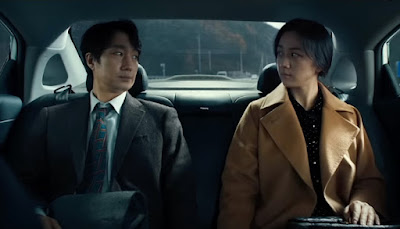Bong Joon-Ho’s Memories of Murder was re-released in 2020 and provided a fresh approach to police procedurals, not just with the cultural references that feel novel when judged against Line of Duty and Bloodlands, but also the quirky characterisations and backstories.
New release Decision to Leave follows Detective Hae-jun (played by Park Hae-il) who is easily distracted from a prolonged and so-far-unsolved district case by the apparent suicide of a lawyer out rock climbing. As the police go through the motions of eliminating his Chinese wife Seo-rae (Tang Wei) from their inquiries, small details in some of her responses to their questioning don’t quite add up. Soon Hae-jun is embroiled in this new case, prising it apart, sewing it back together, and ultimately opening up the old wound for another look.
Hae-jun can’t sleep. He’s living during the week in Busan, driving back and forth at weekends to the foggy, coastal town of Ipo where his wife lives and works. The film’s English title hints at the fraught nature of his marriage, but also at the relocation of some of the characters, and the film’s final, bitter twist.We learn that everything in the fallen climber’s life seems to be monogrammed, from his backpack to his wife who bears his tattoo along with much bruising. We watch as the sleepless officer obsessively stakes out his prime suspect’s apartment, imagining himself present in her life and in her living room as he watches from afar through binoculars.
The sense of unease builds, explodes, wanes and rebuilds in this 138-minute-long epic that nearly comes into land before embarking on a half hour coda that throws everything that seemed settled – good and bad – back up into the air. Director Park Chan-wook is king of the cinematic surprise.
Neither of the lead characters in this noir drama is a hero. Neither is above suspicion in the criminal or fidelity departments. There is love without sex. (Well, one scene that is so deliberately mechanical that the couple involved have averted their own eyes never mind those of the audience!) There is crime without punishment. And truth remains slippery throughout.
Hae-jun’s younger sidekick Soo-wan (Go Kyung-Pyo) smokes two cigarettes at a time, likes to carry a gun, but is useless in the frequent chases that in South Korean films inevitably involve running up flights of steps. He’s one of a number of secondary characters placed in the action to inject humour into unexpected moments. There’s a rooftop chase scene that could be straight out of the Bourne franchise, except Yeong-wook Jo’s score is pared back and better balanced with the fraught intensity of the action.
Watching people text each other has killed the pace of many movies. Decision to Leave uses it intelligently, and we learn more about what makes the characters tick than just what they’re saying. The sparing use of mobile app translation to compensate for Seo-rae’s lack of confidence with Korean vocabulary is effective too. A later scene watching through the glass phone screen as someone texts is nearly beautiful enough to forgive the film’s lumpy ending.
Decision to Leave is a love story mixed in with a police procedural about love, death, surveillance, infidelity and what motivates people to take life-changing actions. It’s also South Korea’s entry for the Best International Feature Film category at the 2023 Academy Awards. It will be a serious contender. Catch it at Queen’s Film Theatre from Friday 21 October.
Enjoyed this review? Why click on the Buy Me a Tea button!


No comments:
Post a Comment